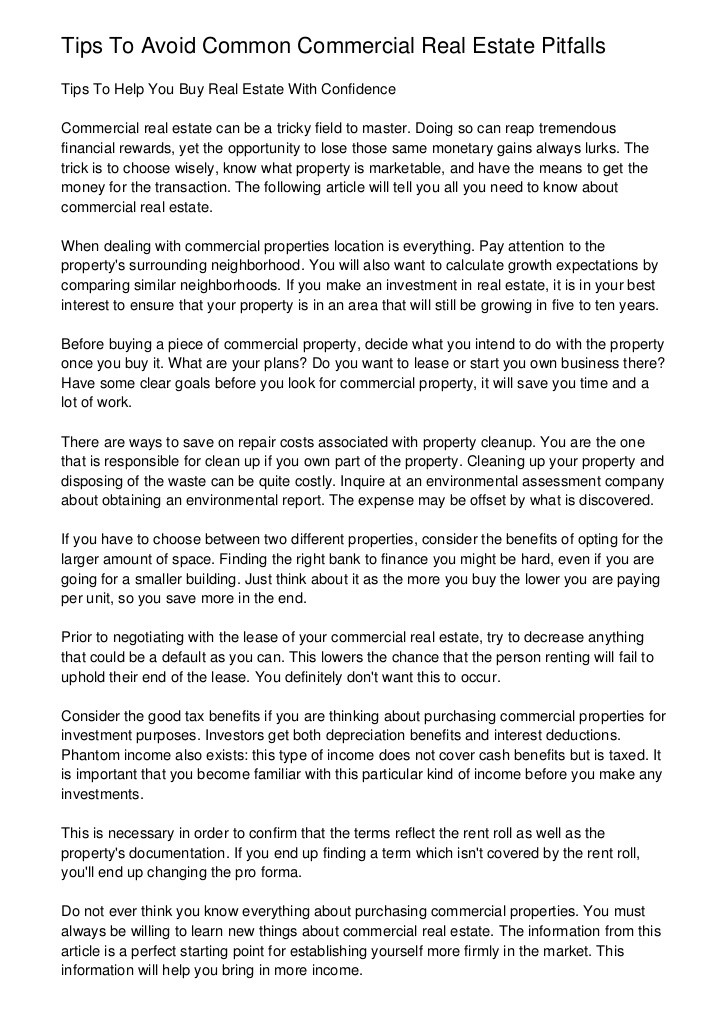Pitfalls of real estate investing
Post on: 11 Июнь, 2015 No Comment

With the housing market improving, is history repeating itself?
Here we go again. With the slow turnaround in the housing market, investors are beginning to come back, shopping for what are perceived as under-valued properties.
Books and seminars are beginning to proliferate once again after a hiatus prompted by the 2008 housing collapse and Great Recession. Radio commercials again tout property buying systems in which the purchaser isn’t required to use their own money. Dozens of new websites offer a treasure of real estate investing advice, training and techniques.
It is true that some early investors during the housing downturn have done pretty well. Investors with cash were in a perfect position to snap up foreclosures that had been damaged or neglected homes that couldn’t pass an inspection for a conventional or FHA loan.
These homes often went for well below the amount of the mortgages that were in default, resulting in a huge loss for the investors who owned the note but a windfall for the investor. Hedge funds were early to the party, buying up thousands of single-family homes that have been converted into rental property.
Rental market
Because fewer consumers can now qualify for a mortgage, more people are limited to renting. That has led to a shortage of rental property in some markets and rising rents. It has been that trend that has drawn small investors back to real estate investing.
But the first pitfall of investing in real estate is actually managing the property. First, it must be prepared for leasing, then advertised. Once tenants move in, the rent has to be collected and repairs made on a regular basis.
You have to hope the tenants don’t damage the property and few purposefully do so. But most people don’t take care of someone else’s property the same way they would their own.
Any profit on the property must take into account local taxes, painting the property between tenants — required by law in many jurisdictions — and the lost rent while it sits empty. And that assumes the tenant pays the rent each month.
here are other pitfalls as well. You could buy a home in an area where rental income isn’t growing but unemployment is. That usually translates into more months without a tenant and stagnant property values.
Despite the fact that home sales and home prices are increasing on average across the country, we are still seeing weaknesses in some markets, said Ingo Winzer, president and founder of Local Market Monitor. a real estate investment company. Sometimes weaknesses can signal opportunity for real estate investors, but not in the markets we ranked as ‘dangerous.’ In those markets, the risk far outweighs any opportunity.
Winzer’s company is one of those behind the We Buy Ugly Houses signs you tend to see everywhere. But these days Winzer is selective about where those signs appear. For example, he’s not putting any up in Battle Creek, Mich. That city tops the company’s list of most dangerous real estate investing markets.
Also making the list are Norwich, Conn. Augusta, Ga. and Port St. Lucie and Daytona Beach, Fla.
All of the markets we ranked as dangerous have a combination of factors such as high unemployment or weak job growth and falling or weak home prices, said Winzer.
That’s not to say that there isn’t money to be made. But it does mean you have to know what you’re doing and be fairly well capitalized.
HomeVestors is another company that buys up houses at a discount. Co-president Ken Channell says that’s the key getting the property at the right price. Most novices tend to overpay. That’s why he says investors must do lots of homework and collect lots of data before making an offer.
This information can help investors determine a purchase price for a property that will allow them to build equity over the long term while generating rental income immediately, he said.
Along that line, the steady rise in home values off their bottoms appears to be slowing and even retreating in some markets. A recent report by Pro Teck Valuation Services suggests the Federal Reserve’s stimulus policy of purchasing mortgage-backed securities isn’t as effective at stimulating home prices as it once was.
Affordability is definitely improved when interest rates are lower, said Norman Miller, professor at the Burnham-Moores Center for Real Estate at the University of San Diego. But it is very likely that the top tiers of the owner-occupied housing market are the ones benefiting the most from lower mortgage rates as this group has been less affected by credit score downgrades or more restrictive underwriting.
What to do
The real estate investment market is probably not fertile ground for the novice investor. As with any investment, you are well-advised to seek the counsel of a trusted and objective financial adviser preferably one familiar with the risks and travails of investing in rental property, before investing in real estate.
A better real estate investment could well be in one of the many real estate investment trusts (REITs), which are securities sold on the stock market and which usually pay an attractive dividend. Depending on the REIT, the income could rival what you would net for a rental property, with a lot fewer headaches.
Before investing, do lots of homework and seek good advice.














